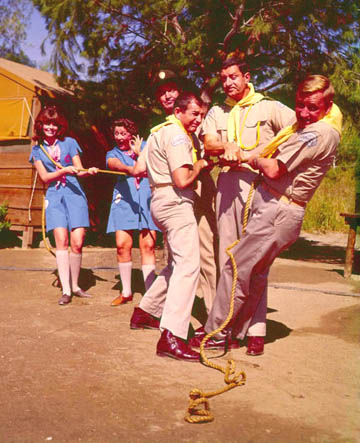
"Runamuck" cast
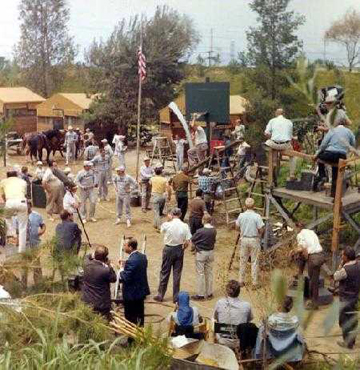
Filming "Runamuck"
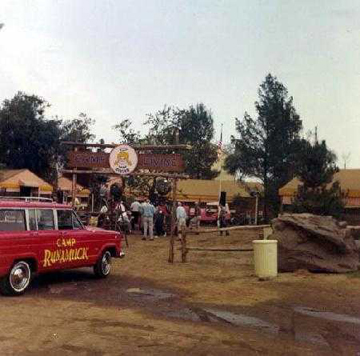
"Runamuck" at the Columbia Ranch
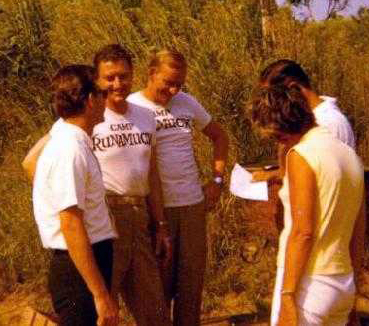
Dave with his "Runamuck" co-stars
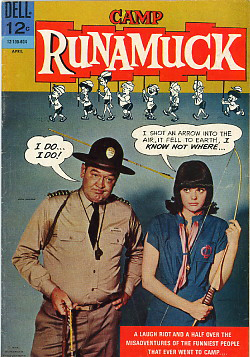
Dell's "Runamuck" one-shot
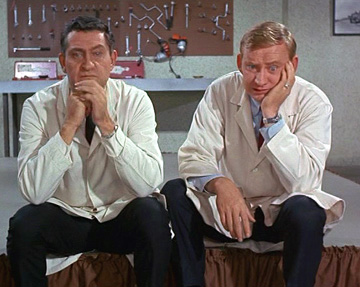
Bewitched "The Super Car"
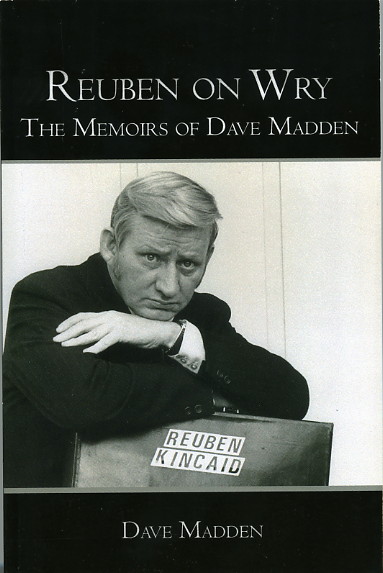
Dave's Memoir
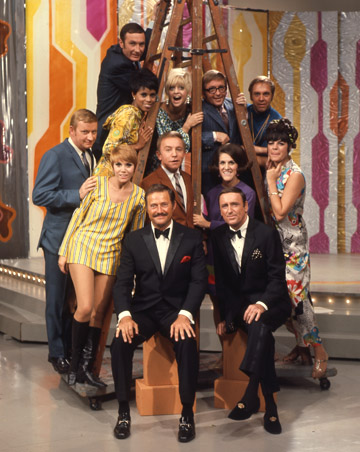
The Cast of "Rowan and Martin's Laugh-In"
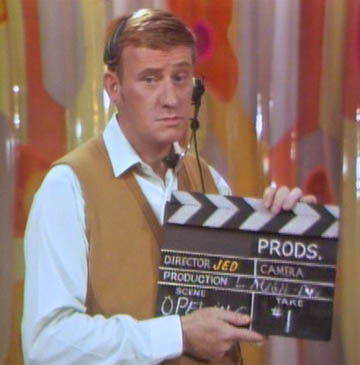
Dave on "Laugh-In"
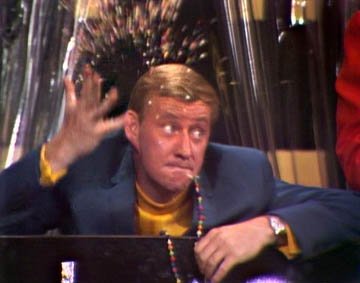
Cue the confetti

Continued:
GH: Tell us what that experience was like; where you filmed, etc.?
DM: Well, we filmed it at the Columbia Ranch in GH: Were the interiors filmed on the Ranch as well?
DM: Well, "Runamuck" was mostly exteriors, but they had an interior set that looked like an exterior, and when the weather was bad, we'd shoot in there.
GH: Do you remember what soundstage you used? DM: Stage 30,the exact same soundstage that we were on for "The Partridge Family." Isn't that interesting? GH: Was it difficult having to work with all those kids?
DM: Well, the show was really about the counselors. It was not about the kids -- not much anyway. So what they did is this: They shot a scene toward the beginning of the year where they had this truck and we were herding the kids onto the truck with their duffle bags and we were sending them home, supposedly at the end of the summer. This was called a stock shot, and they used it a number of times on the show when they didn't want to have any kids in the camp. So they'd use the stock shot to send them away and then they would do a story about the counselors.
GH: I can imagine adding kids on a regular basis would have made the filming schedule difficult?
DM: We didn't interact with the kids much but your assumption is right. We interacted with one another and the stories were for the most part around each other. GH: Is this the first time you met Dave Ketchum and Leonard Stone? DM: Yes, it was. In fact, Dave Ketchum was up for the part of Reuben Kincaid too. When they had narrowed it down to three people, the three were me, Dave Ketchum and another man whose name escapes me. And Dave would have been a very good Reuben Kincaid as far as I'm concerned. But, they decided on me. Dave and I are still good friends. I still get together with him and his wife when I go out to LA. He went on to do some acting work, but he went on to do a lot of writing. He did an enormous amount of writing, with a writing partner. They wrote for a lot of sitcoms. But, " GH: What was it like for you to all of a sudden have your face and character on merchandise, such as comic books?
DM: Well, there are some that say that's where I belong - in a comic book, so I can't really argue that point. GH: How long did the show last? DM: One season. I think we did 28 episodes. GH: Did you know it was going to be cancelled? Were the ratings low? DM: I think we did. We knew we were at the bottom of the ratings. I was surprised that it lasted a whole year. But yeah, there wasn't any doubt. "The Partridge Family," on the other hand, I found out that was cancelled because some guy who lived in the apartment building with me said he read it in the paper. They hadn't yet told us. GH: What did you do once " DM: I did some more clubs, yes. GH: Did you continue performing in clubs on weekends during the run of " DM: No, that was Cassidy. I didn't do that. I was never that thrilled with nightclubs in the first place. Doing these television shows gave you the opportunity of not having to work nightclubs, which I appreciated. The money factor was not a factor at all for me. The fact that I didn't have to go out and work clubs was thrilling. But now that the show was cancelled, there wasn't much else to do but work for clubs. But it was only a couple of years between " GH: You also appeared in your first of two guest spots on "Bewitched." What do you remember about those? DM: Well, I remember I was with the same secondary actor on both shows. His name was Herb Ellis. I worked with him on "The Super Car" episode as well as one set in a department store. Elizabeth Montgomery was very gracious. I didn't have any scenes with Dick York, who played her husband on the show but I remember that the back problems that would eventually end his run on the show, had already started.
GH: You also guest starred on a series called "Accidental Family," with Jerry Van Dyke. In your autobiography, "Reuben On Wry: The Memoirs of Dave Madden," you mentioned you and Jerry are still friends today. Is this where the two of you met?
DM: Well, I was in the pilot. There was a big scene with a card game and I was one of the card players. But no, Jerry and I have known each other since 1952. We were in the Air Force together. GH: How did "Laugh-In" come about for you?? DM: Well they were doing a tour with the cast and they needed somebody to fill time. No one in the cast had an act and they needed somebody to do 20 - 25 minutes in a 2-hour show. Rowan and Martin had seen me work in GH: What was this "tour?" Was it to prime audiences for the series? DM: Well, yeah. The series was planned at the time we did this. We went out two years in a row after that in the summers and did summer tours in rather large venues. But that was after the show was already a success. GH: What was the "Rowan & Martin's Laugh-In" experience like for you?
DM: It wasn't necessarily as much fun as it looked like it was. Mainly because except for the opening and closing joke walls and the cocktail party and maybe a couple of other things like "Laugh-In Looks At The News" and things like that, mostly what we did were little things -- like you'd go in at 10 o'clock in the morning and there would be 2 cameramen, a director, a lighting man, and I would do let's say a dozen black-out skits where I was trying to open the door with the doorknob, or something like that. Just quick little vignette things and they would compile those and spread them out and put them on various shows over the next couple of months. But you'd be working alone. None of the other cast would be there. It could be quite lonely. The only time you saw them would be at the cocktail party, or if you had a skit with them. The whole thing was done in pieces. It was an editor's show. GH: It sounds like an editor's nightmare! DM: Well, yeah I suppose. We had a lady editor named Carolyn Raskin, and she really was - in my opinion - responsible for the success of the show. GH: Did you leave after the first season because you were bored?
DM: Well, yeah - they had you doing the same things over and over again. The show was so popular that once you had been exposed to the "Laugh-In" audience, more exposure was sort of like spinning your wheels, and I wanted to do something else. GH: Explain what that exposure was like for you - to suddenly be famous on a national level? DM: Well I've always said that fame and fortune - the two things that one seems to go after when they go into show business - they want to be famous and they want to make a lot of money - I found that making a lot of money was suddenly not as important. Making enough money was important, but not necessarily making a lot. And fame was not at all what it was cracked up to be as far as I was concerned. I found fame to be somewhat of a prison. The more famous you were, the smaller the cell that you had to live in. GH: I think David Cassidy found that to be true, too - didn't he?